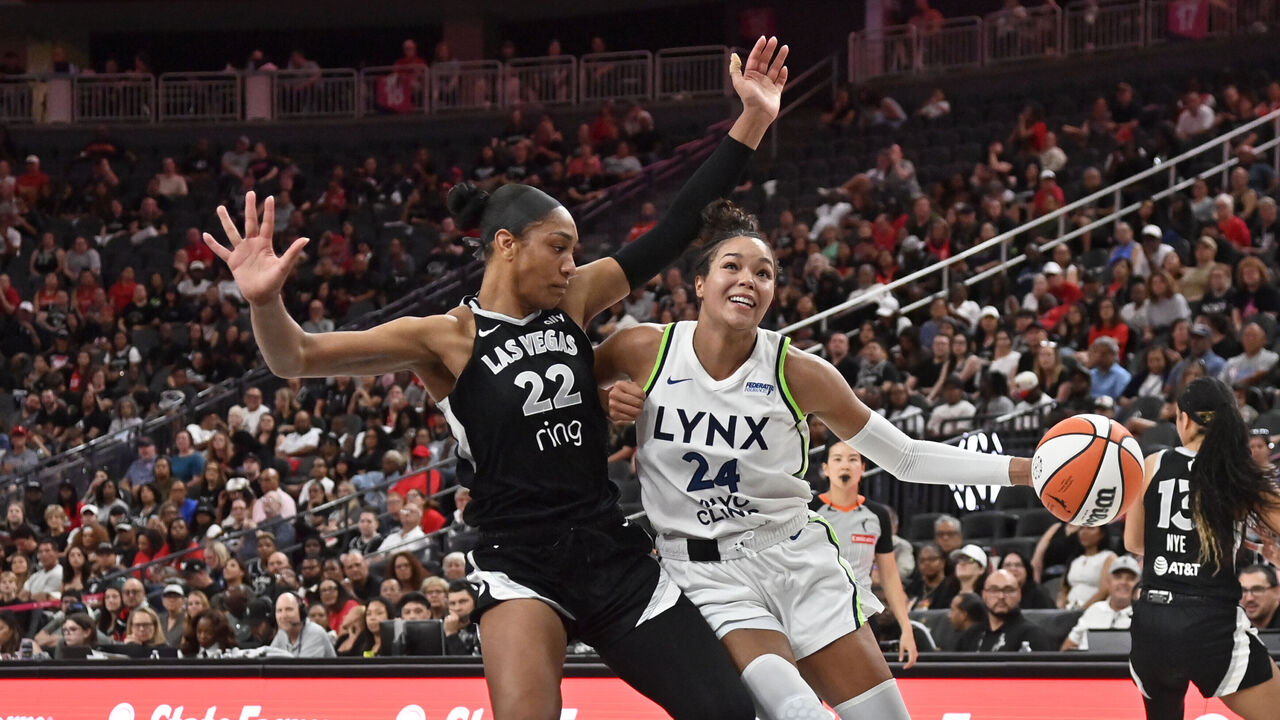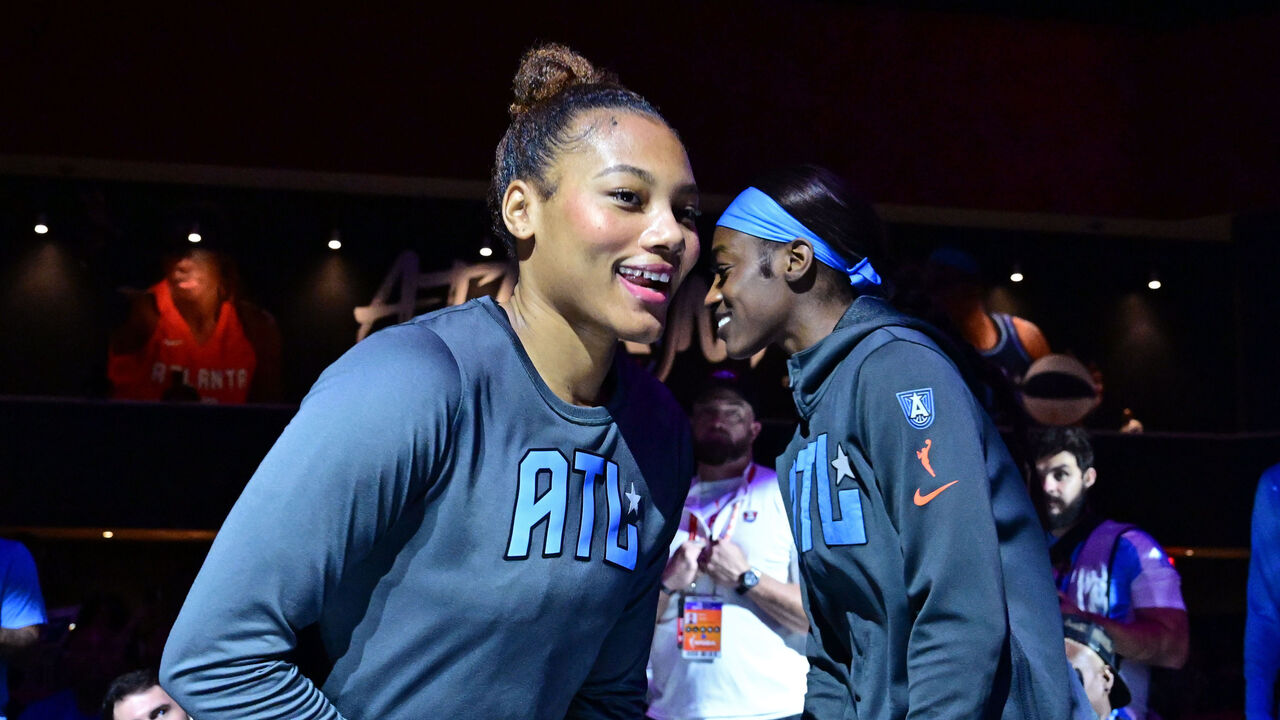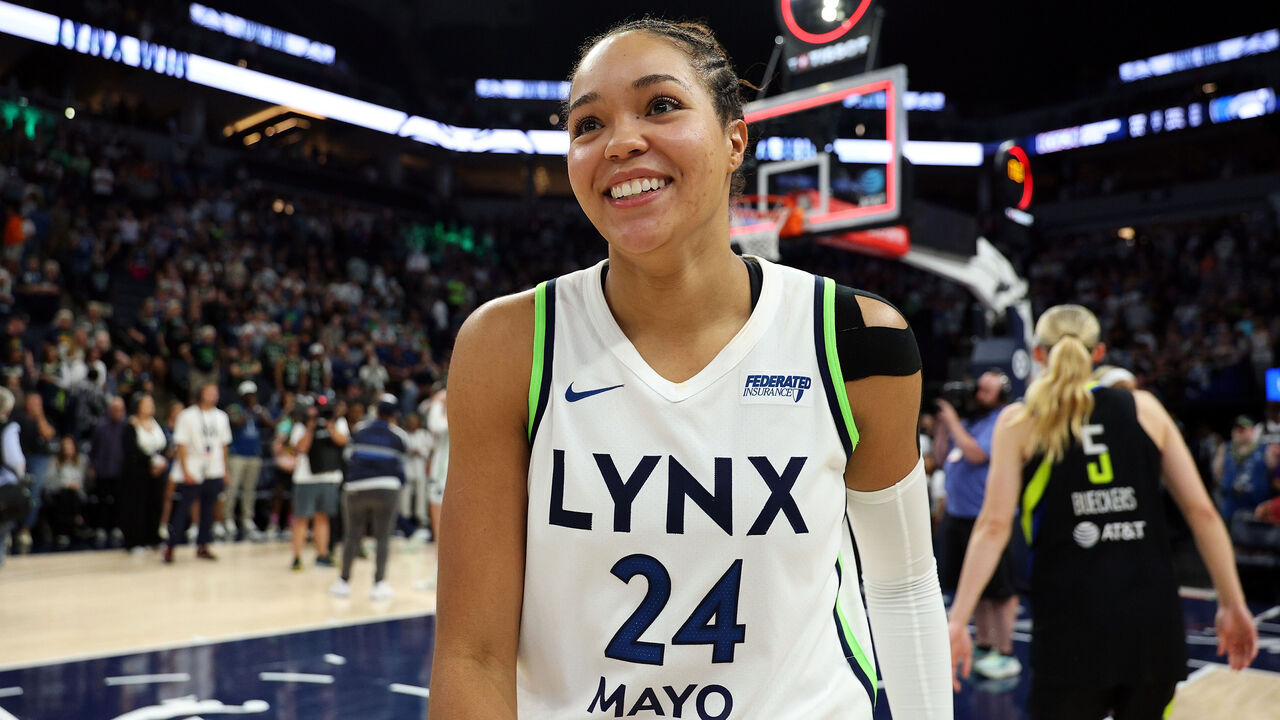WNBA Awards Watch: Phee, Paige lead at end of season
Welcome to our recurring look at the various individual awards in the WNBA. This time, we're tapping in on the eve of the conclusion of the 2025 regular season with our picks to win each of the six accolades.
Rookie of the Year
3. Sonia Citron (Mystics): Washington's decision to trade Ariel Atkins to the Chicago Sky for the opportunity to select Citron at No. 3 overall was a stroke of genius by the Mystics' front office. Citron's excellence on both ends of the floor earned her an All-Star nod. She's second league-wide in fourth-quarter scoring (209 points) and second in 3-point percentage (44.5%). Citron's effective off the ball as a cutter, too, and she routinely guards the opposition's top perimeter threats.
2. Kiki Iriafen (Mystics): Iriafen is the second half of the Mystics' All-Star rookie tandem. The USC product supplanted Aaliyah Edwards as the starting power forward, quickly establishing herself as an elite rebounder with her relentless motor. Iriafen set a new franchise single-season record for double-doubles and a rookie team record for free-throw attempts.
1. Paige Bueckers (Wings): This year's No. 1 overall pick has lived up to the billing. Bueckers became the 10th rookie to start a WNBA All-Star Game and went off for a career-high 44 points against the Sparks in August to tie the single-game scoring mark by any first-year player. She's a mid-range assassin and an impact defender who's demonstrated great leadership amid a trying season. Bueckers has all the makings of one of the league's premier players for years to come.
Defensive Player of the Year
3. Gabby Williams (Storm): Seattle would not have been able to lock up the final playoff seed this late in the campaign without Williams' pesky defense. Even after setting a franchise record with eight steals June 17 against the Los Angeles Sparks, she averaged 2.1 swipes in the 32 games that followed, which still kept her neck and neck with Sun guard Leila Lacan for the league lead.
2. Napheesa Collier (Lynx): As the Lynx put the finishing touches on a nearly wire-to-wire season in first place, Collier keeps proving herself as one of the WNBA's few elite two-way stars. With a combined 3.2 stocks (steals plus blocks), Collier's defensive value to Minnesota is as indisputable as her career-high and team-leading 23 points per contest. Specifically, perimeter defense has been her calling card; opponents are shooting just 31.7% on 6.5 attempts per game between 16-24 feet when Collier's on the floor. The Lynx star isn't defending all of those attempts herself, but it's still the worst clip by opponents within that range against any currently rostered player in the league.

1. A'ja Wilson (Aces): Wilson's stellar individual prowess will likely be enough to earn her DPOY over Collier, who benefits from a better defensive supporting cast. Wilson tops the WNBA in blocks per game (2.3) while registering 55.7% of Las Vegas' rejections during her minutes. She's tied for fifth in the league in steals (matching Collier's 1.6). And, among players with at least 500 minutes, she boasts the best defensive rating (99.3 points allowed per 100 possessions) on the Aces while their defense is at its worst (105.2) when she isn't playing.
Most Improved Player
3. Allisha Gray (Dream): Gray's small but noticeable jump in efficiency - she went from 40.3/34.2/76.9 shooting splits in 2024 to 44.9/38/79.9 this season - is just one of the many factors that make this Atlanta squad much more dangerous than last year's iteration. However, the fact that she's become more efficient on career-high volume across the board - while simultaneously becoming a better facilitator for her teammates - is what legitimizes the case for a back-to-back-to-back All-Star winning Most Improved Player at age 30.
2. Azura Stevens (Sparks): Stevens has never shot better from deep over a full season than she has in 2025, which is why the Sparks vet is putting up a career-high 12.9 points per game in Year 8. But while she's converting a personal-best 38.6% of shots from beyond the arc, the percentage of her points that come from threes is actually down year over year (43.8% to 39.4%); instead, the rate of her fast-break points has climbed (9.4% to 13.3%), showing she's simply been more effective in transition opportunities.
1. Veronica Burton (Valkyries): It was difficult to be optimistic about Burton's career trajectory at this time last year. Her minutes had dipped for a third straight season and she'd failed to cement a rotation spot with the Connecticut Sun after two years in Dallas with the same outcome. All that only boosts her case to win Most Improved Player in Year 4 after nearly quadrupling her scoring to 12 points per game while adding six assists and 4.4 rebounds - all of which represent career bests - and helping guarantee a playoff berth in the Valkyries' inaugural season.
Sixth Player of the Year
3. Natisha Hiedeman (Lynx): Hiedeman was on a heater down the stretch, scoring 20 or more in three straight September games before a quieter 6-point night Tuesday. She displayed some of her best shooting of the year during those three contests, going 12-of-18 (66.7%) on threes amid a significant minutes bump this month. Her increased playing time is at least partially due to the Lynx already locking up the top seed, but Hiedeman's electric (if streaky) touch off the bench has been a critical component of Minnesota's success all year.
2. DeWanna Bonner (Mercury): Bonner's contributions off the bench have gotten much better since she joined the Mercury in early July after an unsuccessful nine-game run with the Fever. At 10.9 points per game, the 37-year-old is the only player in the league predominantly deployed as a reserve with a double-digit scoring average (minimum 20 games this season), keeping her firmly in the mix for a fourth Sixth Player of the Year honor and what would be her first in 14 years.

1. Naz Hillmon (Dream): In terms of overall impact, Hillmon has arguably been Atlanta's most important player all season. The fourth-year forward doesn't light up opponents like top-scoring teammates Allisha Gray or Rhyne Howard, but the metrics show Hillmon is also indispensable to the offense, as she features in the Dream's six best three-person lineups by offensive rating and eight of the top 10 (minimum 100 minutes). She also owns the best on-court net rating (14.2) of any Atlanta player who's played at least 50 minutes all season.
Coach of the Year
3. Cheryl Reeve (Lynx): Reeve is seeking a record-extending fifth Coach of the Year award. The Lynx have been on a mission since losing last year's Finals in heartbreaking fashion. They own the league's top record by a fair margin as well as the No. 1 offense and defense. Minnesota is also one victory away from tying the WNBA's single-season record of 34 wins set by the Aces in 2023.
2. Karl Smesko (Dream): Smesko made the jump to the pros following a 22-year run with Florida Gulf Coast, where his teams were known for their heavy 3-point volume. The third-seeded Dream have enjoyed great success using the same formula, ranking second in offensive efficiency after averaging the fewest points last season.
1. Natalie Nakase (Valkyries): The rookie head coach virtually wrapped up the award when Golden State became the first WNBA team to clinch a playoff berth in its inaugural season. The Valkyries' 23-20 record is just three games behind the defending champion Liberty and shatters the previous expansion-wins mark of 17 set by the Detroit Shock in 1998. Nakase's squad also boasts the league's fourth-best defense.
Most Valuable Player
3. Alyssa Thomas (Mercury): Phoenix's point forward deserves more consideration for the WNBA's top individual honor. Thomas broke her own single-season WNBA record for triple-doubles and surpassed Caitlin Clark's league mark for assists in one campaign. She's also the first player in WNBA history to drop at least 300 dimes in three consecutive seasons.
2. A'ja Wilson (Aces): The 6-foot-4 center is making a compelling case for a fourth MVP award. Las Vegas' surge up the standings has coincided with Wilson's best stretch of play, as the seven-time All-Star is averaging 26.3 points, 11.5 boards, 2.1 blocks, and 1.6 steals during the Aces' 15-game win streak. Her rim-protection has been paramount with Las Vegas taking a step back defensively. Wilson's on pace to lead her peers in blocks (2.3) for the fourth straight campaign.

1. Napheesa Collier (Lynx): Collier might've been the runaway winner for MVP if she hadn't been sidelined for seven contests. The All-Star forward is the undisputed top player on the league's best team, providing three-level scoring as well as elite defense. Collier ranks in the WNBA's top five in scoring (23), steals (1.6), and blocks (1.6). The Lynx have a plus-11 net rating when the UConn product is on the floor.
HEADLINES
- Unrivaled expands with 2 new clubs plus player development pool
- Storm secure last WNBA playoff spot on Wheeler's go-ahead jumper
- Loyd reaches 6K points, Aces bring down Sky for 15th straight win
- Fever top Lynx to set new single-season franchise record for wins
- Ionescu returns to help Liberty hand Mystics 10th straight loss